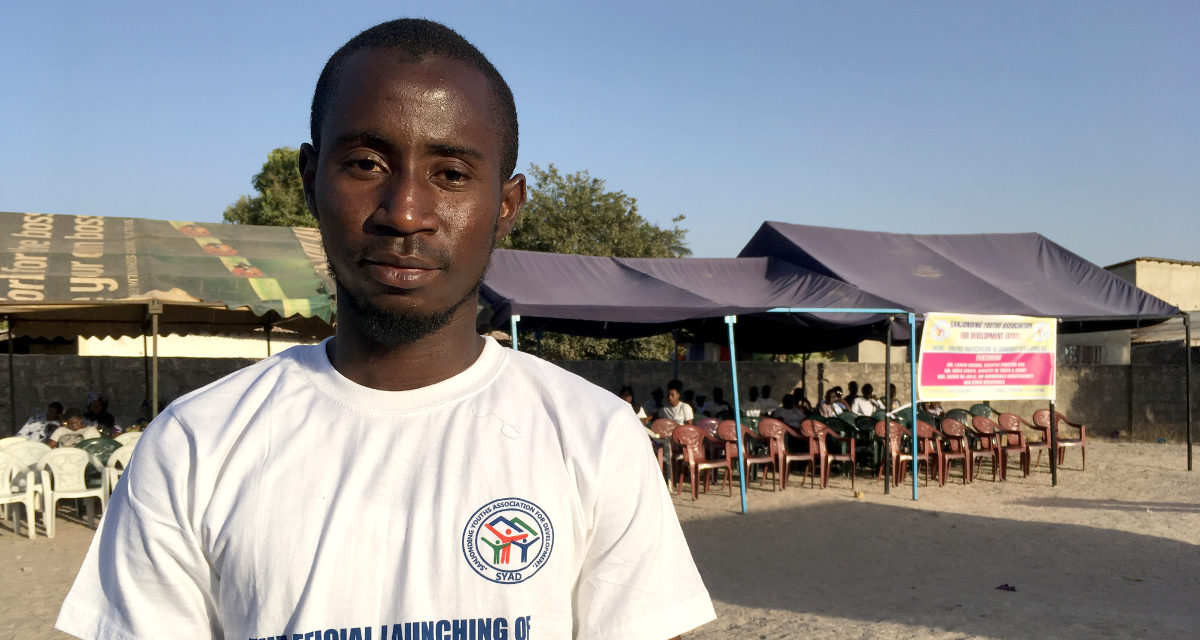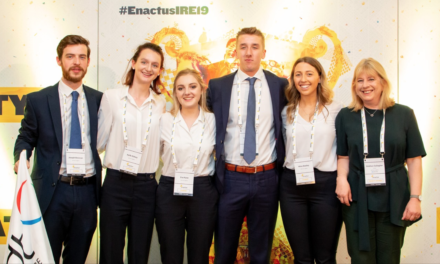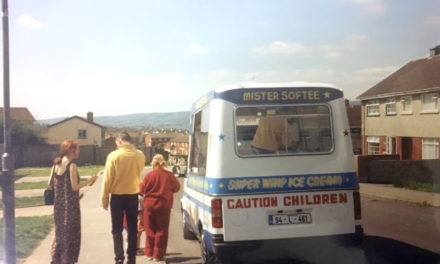Allen Meagher returns to the Gambia, the country where he worked with Irish volunteer organisation APSO in the 90s, to see how communities are developing after the democratic ouster of its former dictator.
When a country overthrows a brutal dictator after 22 years, as the Gambia did through democratic elections in December 2016, the only way is up.
Until two years ago, the dictator sowed distrust in every community. Who was a spy? You never knew. The repercussions of voicing criticism could be deadly.
People are now much more at ease within themselves, their homes and their communities.
Demba Jawo was a journalist whose life was under threat, but the tables turned when democracy won out. He was appointed the Gambia’s Communications Minister for the first 15 months of the new government.
“Now there is a lot of hope in the air,” he told Changing Ireland earlier this year. “You go out in the street, you see everybody is happy with the new dispensations, the freedom of speech and freedom of movement.”
In 2016, Gambian people found their voice, the dictator lost the presidential election and an alliance of West African countries ensured there was a peaceful transfer of power. Once Yahya Jammeh heard Senegalese jets fly over the presidential palace in January 2017, he knew the game was up.
Diaspora Gambians, many pining to go home, followed every dramatic turn on social media.
But the historic ousting of one of Africa’s brutal dictators did not get quite the international coverage it merited, because global media were pre-occupied with unfolding events in the USA.
The sprawling diaspora and good intentions
Adama Barrow, a compromise candidate representing the hopes of all the main parties, was sworn in the day before Trump took office on the other side of the Atlantic. One democracy restored; another lost. The Smiling Coast, as the tourism department likes to call it, was smiling once more.
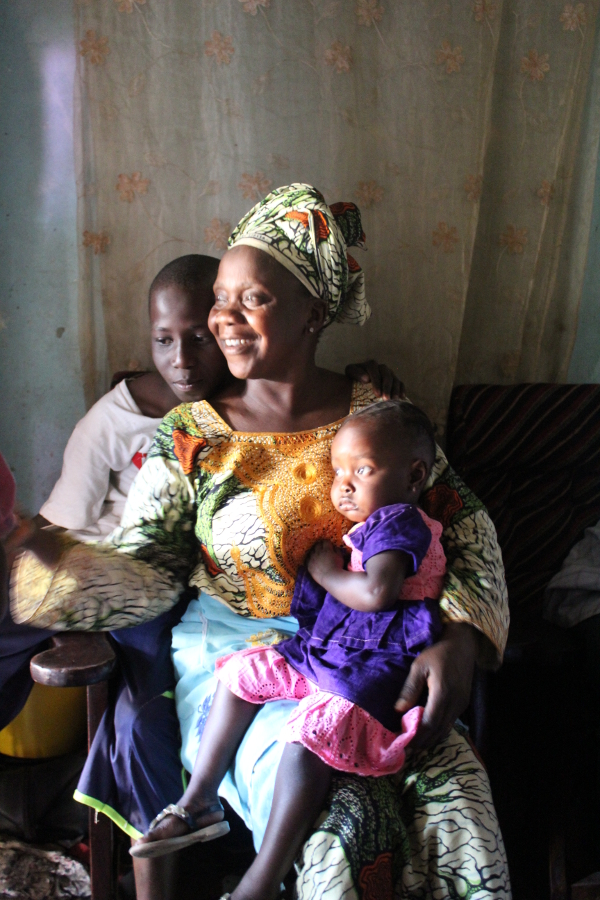
Sally, Jarjue and Kunda Badjie, pictured at a naming ceremony in Busumbala.
“However, expectations are much higher than what is possible,” warned Minister Jawo.
People are now placing trust in community organisations once again and – as well as there being an influx of EU aid – diaspora Gambians are setting up charities to help their fellow citizens in one of the world’s most materially impoverished countries.
I met two Gambians, separately, who returned with good intentions.
Claudius Taylor, a lawyer based in London, runs Banjul Open Box: “We send law books to the Ministry of Justice and Gambia University. We reach out to Gambians through education and other social welfare means.”
Musa Sanyang, now living in Leipzig, Germany, is involved in a charity called Schools for Gambia.
“We have built, renovated and expanded numerous schools, [and] sent and distributed containers of school furniture, school supplies, textbooks, clothing and other donations to the Gambia,” he said.
A dark past
I lived and worked in the Gambia – via the now defunct Agency for Personal Service Overseas (APSO), which operated from 1974 to 2001 – during the mid-1990s, when the country’s media practitioners were to the fore pushing for democracy, human rights, freedom of expression and proper governance. Without those basics, community development and national development could not progress.
Jammeh had his critics arrested and tortured, and sent murder squads after those whose reporting he feared most. Media houses were burnt down.
His face was on billboards everywhere – quickly torn down when he lost the presidency – and also on banknotes, which are slower to replace. He married and divorced a series of women, had homes in various countries and a fleet of flash cars, and insisted on being addressed as His Excellency Sheikh Professor Alhaji Dr Yahya AJJ Jammeh Babili Mansa.
Jammeh was a thief, a torturer and a mass murderer, and he twisted religion to suit his criminal pursuits. His legacy is now being dissected at truth and reconciliation hearings deemed essential to the country’s recovery.
Gambians still complain plenty about the new government, but it was democratically elected and people now genuinely enjoy freedoms they had not known since 1994, if they had even been born then.
Community living
It’s a small country – the smallest on the continent – where everyone feels they know each other. During Jammeh’s tenure, villages still held ceremonies to mark births, comings-of-age, marriages and deaths. Soccer matches and wrestling continued.
However, when it came to community development, people needed to be open and trusting of each other. That wasn’t always possible.
“You could not trust anyone but your family and closest friends,” said Lamin Sanyang, a civil servant who (quietly) opposed the regime throughout.
Jammeh fired village Alkalos [village chiefs] and community leaders who did not support his regime. In 2012, he began to terrorise communities by sending out a team of witch-doctors with military backing. Communities, including elders, were humiliated.
This helped to drive people to oppose his rule, said Mr Sanyang. Abroad, tens of thousands of Gambians forced into exile began to organise via social media in protests that ultimately helped to topple him.
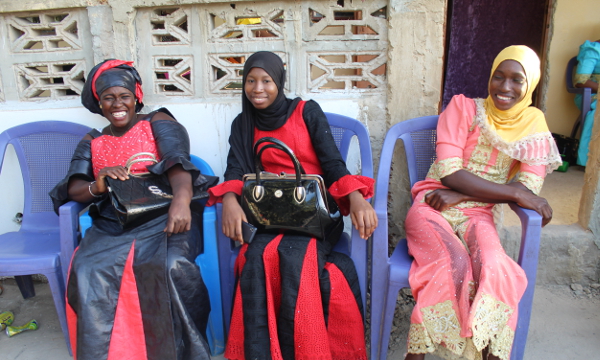
Women at the Busumbala naming ceremony.
Mr Sanyang brought me to a naming ceremony in his native Busumbala, Western Division. He said, “we have freedom now to do and speak what we want”.
However, the Gambia’s version of Tidy Towns has, for the time being, collapsed. Monthly Set Settal clean-up operations became an involuntary activity under Jammeh.
“During Jammeh’s time, it was kind of forced onto people. There was a period from 9 o’clock to 1pm when no vehicles were allowed to move and shops were closed. People were not happy with the situation,” said Minister Jawo.
After Jammeh’s demise, the new government struggled to get communities involved in clean-ups and, earlier this year, it gave up, realising people had enough of top-down mandates.
“When this government came to office we tried to continue with these cleaning exercises, but people would just stay at home. So, we thought the best way is to allow people to do it on their own on a voluntary basis. We abandoned the idea of trying to do it the way Jammeh used to do it.”
Bottom-up community development is now stronger in the Gambia. For example, successful clean-ups were organised by a civil society group in December to tackle plastic polluting the country’s beaches.
“People are now free to do things on their own, without having to look behind them to see if somebody is watching them all the time,” said Minister Jawo. “With freedom of speech, freedom of movement and everything, people are encouraged to take matters into their own hands and do things exactly the way they want them done. So, community development is definitely picking up very fast.”
Communities groups are now free to organise, hold gatherings and fundraise. There has been a sunburst of activity the length and short breadth of the country.
Renewed freedoms
An example of one of the many local community groups to launch this year is Sanjonding Youths Association for Development (SYAD). Its president, Mustafa Saho, told me, “We want the community to reflect on the role of youths’ participation in community development.”
The youth-led community organisation had done charitable works for some years, but without ever formally launching, so SYDA ran a high-profile event to highlight its successes to date and to “inspire and create partnerships with other organisations”.
Mr Saho said, “Youths are the cornerstone for any community development, and we have to be centre-stage as far as community development is concerned. We want to take ownership and take responsibility in our communities. We want to make sure that all community facilities are better available and that people benefit from these facilities.”
Afterwards, he heralded the launch as a great success “because it fostered the spirit of unity, tolerance and understanding among the young people of Sanjonding community. This is one of our top priorities in the peace and reconciliation process at the community level”.
The news media – locally and nationally – are central to recovery. In Fajara, I called to The Point newspaper and met former colleagues of murdered co-founder Deyda Hydara.
Jammeh, in particular, sought to silence reporters who asked how he enriched himself. He said his millions came “from Allah”, but his claim was at Gambian people’s expense; many died escaping poverty and violence on the treacherous journey to Europe.
Later, with Lamin Sanyang, I visited the street corner where Mr Hydara was killed. Previously, people who visited this place were followed and beaten. Now, the talk is of one day erecting a statue, or symbol, in tribute to Hydara’s peaceful resistance.
The printed newspapers that survived are now prospering, relatively speaking, and are very sincere in purpose.
Pap Seine, a 2010 World Press Freedom Hero, was arrested “many times” and witnessed much suffering as the other co-founder of The Point. His vision and optimism is however undimmable.
Looking forward, he sees his newspaper spawning a television station. Yet, what remains uppermost in his mind is that the Gambia “upholds democratic values”. This is more important to him than any profit margins.
“We are working tirelessly to promote good governance, respect of human rights and the rule of law,” he said.
The Point, while critical, enjoys good relations with Barrow’s government.
“There is no censorship, thank God,” said Mr Seine.
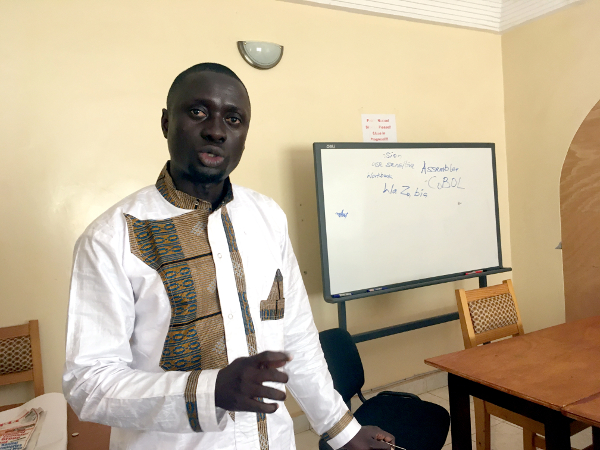
Sam Mendy, head of the Gambia Press Union’s school of journalism.
Peace and recovery
While a minority still support Jammeh’s old party, most Gambians, having won freedom through the ballot box and in street protests, share Mr Seine’s values. Today, The Point is the most popular newspaper in the Gambia.
Mercifully, community radio stations survived the cull of the mainstream media. They stuck to safe subjects, such as giving agricultural advice. Now, they are expanding in number and in confidence, and training is provided to their broadcasters by the Gambia Press Union (GPU).
“We recognise community radio as very important,” said Sam Mendy, head of the GPU’s School of Journalism.
In 2017, 25 broadcasters from 10 stations received training. The stations are seen as “a mouthpiece for rural communities and as a tool for development”, according to Yusupha Bojang, coordinator of the Network of Community Radios of the Gambia.
Mr Mendy showed me around the journalism school, uselessly flicking the light switch in the studio. It remained dark. One of the biggest challenges facing the government is improving the electricity supply.
From the early 1990s to now, the Gambia’s population has almost doubled (to over two million people), but average income remains low (€100 per month, said one bank clerk). The Gambia ranked as the 13th poorest country in the world in 1995, and was in much the same position when Jammeh was deposed. Unemployment is high and the country is over-reliant on agriculture and tourism.
But, change is coming. Diaspora remittances are now a significant help to the economy, the EU has promised more aid, and specific European countries promise investment.
While Jammeh reintroduced the death penalty, pulled the Gambia out of the Commonwealth, and declared the country an Islamic state, all three positions have been reversed under Barrow.
Peace has come, but recovery takes time.
Reporting conducted with support from the Simon Cumbers Media Fund.

